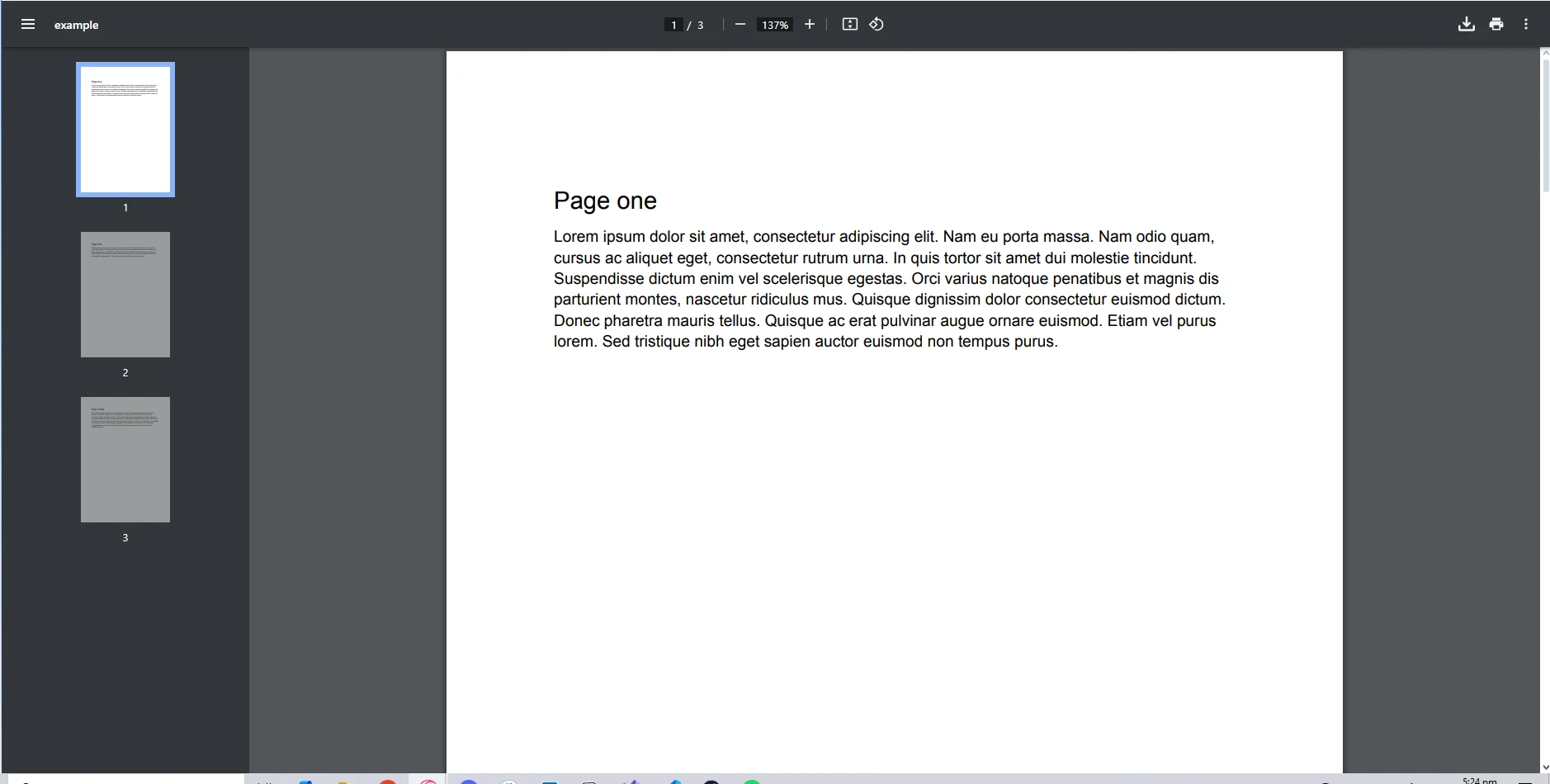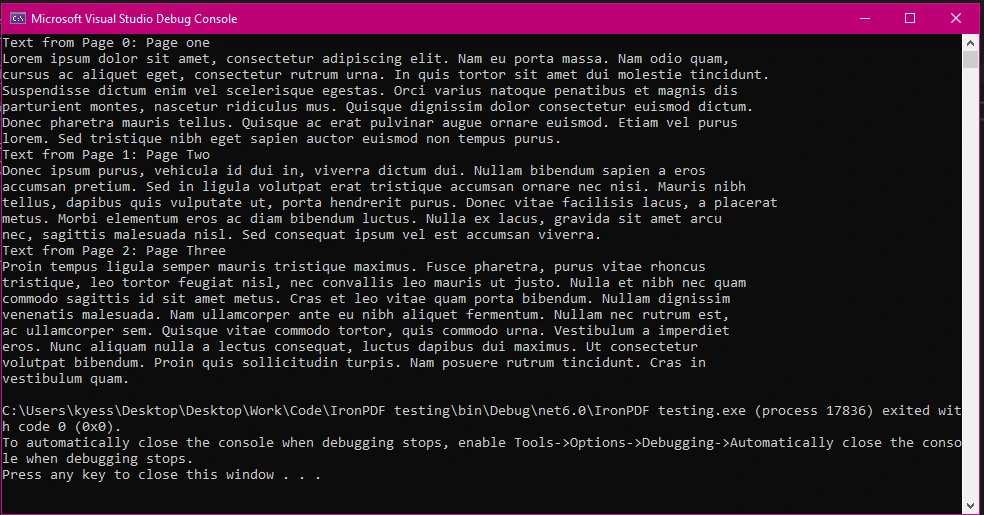在生产环境中测试,无水印。
随时随地满足您的需求。
获得30天的全功能产品。
几分钟内就能启动并运行。
在您的产品试用期间,全面访问我们的支持工程团队。
铸造在 C# 中,"转换 "是一项强大的功能,允许开发人员将一种数据类型的变量转换为另一种数据类型。 它在面向对象编程中发挥着至关重要的作用,尤其是在处理继承层次结构或使用接口时。 在使用像IronPDF对于 PDF 操作而言,理解铸造对于有效管理各种类型的 PDF 元素和操作至关重要
在本文中,我们将探讨 C# 中铸造的概念、其意义以及在使用 IronPDF 时如何应用。 最后,您将了解如何利用铸造增强您的 PDF 处理能力并简化您的开发流程。 我们鼓励您试用 IronPDF 免费试用版,亲身体验这些优势。
在 C# 中,铸造大致可分为两种类型: 隐式转换和显式转换**。
int myInt = 10; // Integer variable
double myDouble = myInt; // Implicit casting from int to doubleint myInt = 10; // Integer variable
double myDouble = myInt; // Implicit casting from int to doubleDim myInt As Integer = 10 ' Integer variable
Dim myDouble As Double = myInt ' Implicit casting from int to double这一过程通常被称为自动转换,因为 C# 编译器无需开发人员的任何明确指令即可处理。
double myDouble = 9.78;
int myInt = (int)myDouble; // Explicit casting from double to intdouble myDouble = 9.78;
int myInt = (int)myDouble; // Explicit casting from double to intImports System
Dim myDouble As Double = 9.78
Dim myInt As Integer = CInt(Math.Truncate(myDouble)) ' Explicit casting from double to int在这种情况下,开发人员必须说明他们打算将数据类型转换为另一种类型,因此称为显式类型转换。
铸造常用于涉及基类和派生类的场景。 例如,在处理类层次结构时,可以将派生类对象转换为基类类型:
class Base { }
class Derived : Base { }
Derived derived = new Derived();
Base baseRef = derived; // Implicit casting to base classclass Base { }
class Derived : Base { }
Derived derived = new Derived();
Base baseRef = derived; // Implicit casting to base classFriend Class Base
End Class
Friend Class Derived
Inherits Base
End Class
Private derived As New Derived()
Private baseRef As Base = derived ' Implicit casting to base class使用 IronPDF 时,在处理各种 PDF 相关类时,如要将通用 PDF 对象转换为更特定的类型以访问某些属性或方法时,铸造是必不可少的。
开始使用IronPDF请注意,您首先需要安装它。 如果已经安装,则可以跳到下一节,否则,以下步骤将介绍如何安装 IronPDF 库。
至安装 IronPdf使用 NuGet 软件包管理器控制台,打开 Visual Studio 并导航到软件包管理器控制台。 然后运行以下命令:
Install-Package IronPdfInstall-Package IronPdf'INSTANT VB TODO TASK: The following line uses invalid syntax:
'Install-Package IronPdf打开 Visual Studio,进入 "工具 -> NuGet 包管理器 -> 管理解决方案的 NuGet 包 "并搜索 IronPdf。 在这里,您只需选择您的项目并点击 "安装",IronPDF 就会添加到您的项目中。
安装 IronPDF 后,只需在代码顶部添加正确的 using 语句即可开始使用 IronPDF:
using IronPdf;using IronPdf;Imports IronPdfIronPDF 提供了多个操作 PDF 文档的类,如PdfDocument, ChromePdfRenderer和PDFPage. 了解这些类型如何通过铸造进行交互对于有效操作 PDF 至关重要。
例如,您可能有一个通用的 PdfDocument 对象集合,需要使用一个特定的 PdfPage 对象。 您可以通过铸造来实现这一目标:
PdfDocument pdfDoc = new PdfDocument(210, 297);
PdfPage page = (PdfPage)pdfDoc.Pages[0]; // Casting a generic PDF page to a specific typePdfDocument pdfDoc = new PdfDocument(210, 297);
PdfPage page = (PdfPage)pdfDoc.Pages[0]; // Casting a generic PDF page to a specific typeDim pdfDoc As New PdfDocument(210, 297)
Dim page As PdfPage = CType(pdfDoc.Pages(0), PdfPage) ' Casting a generic PDF page to a specific type通过该铸件,您可以访问 PdfPage 特有的属性和方法,从而增强对 PDF 内容的控制。
让我们看看下面的示例,我们需要从 PDF 中提取文本并适当转换对象:
using IronPdf;
using IronPdf.Pages;
using System;
public static void Main(string[] args)
{
PdfDocument pdf = PdfDocument.FromFile("example.pdf");
foreach (PdfPage page in pdf.Pages)
{
PdfPage pdfPage = (PdfPage)page;
string text = pdfPage.Text;
Console.WriteLine($"Text from Page {pdfPage.PageIndex}: {text}");
}
}using IronPdf;
using IronPdf.Pages;
using System;
public static void Main(string[] args)
{
PdfDocument pdf = PdfDocument.FromFile("example.pdf");
foreach (PdfPage page in pdf.Pages)
{
PdfPage pdfPage = (PdfPage)page;
string text = pdfPage.Text;
Console.WriteLine($"Text from Page {pdfPage.PageIndex}: {text}");
}
}Imports IronPdf
Imports IronPdf.Pages
Imports System
Public Shared Sub Main(ByVal args() As String)
Dim pdf As PdfDocument = PdfDocument.FromFile("example.pdf")
For Each page As PdfPage In pdf.Pages
Dim pdfPage As PdfPage = CType(page, PdfPage)
Dim text As String = pdfPage.Text
Console.WriteLine($"Text from Page {pdfPage.PageIndex}: {text}")
Next page
End Sub输入 PDF:

控制台输出

在此示例中,我们加载 PDF 文档,遍历其页面,并将每个页面转换为 PdfPage 以提取文本内容。 其中重点介绍了铸造如何使您能够使用 IronPDF 类的特定属性和方法。
在进行转换时,必须确保转换是有效的,以避免在运行时出现 InvalidCastException。以下是一些最佳实践:
PdfPage pdfPage = page as PdfPage; // Safe cast
if (pdfPage != null)
{
// Proceed with pdfPage
}PdfPage pdfPage = page as PdfPage; // Safe cast
if (pdfPage != null)
{
// Proceed with pdfPage
}Dim pdfPage As PdfPage = TryCast(page, PdfPage) ' Safe cast
If pdfPage IsNot Nothing Then
' Proceed with pdfPage
End Ifif (page is PdfPage)
{
PdfPage pdfPage = (PdfPage)page; // Safe cast after type check
}if (page is PdfPage)
{
PdfPage pdfPage = (PdfPage)page; // Safe cast after type check
}If TypeOf page Is PdfPage Then
Dim pdfPage As PdfPage = CType(page, PdfPage) ' Safe cast after type check
End Ifpublic class MyCustomType
{
public static explicit operator MyCustomType(int value)
{
return new MyCustomType(/* conversion logic */);
}
}
int myInt = 5;
MyCustomType myCustomType = (MyCustomType)myInt; // Using explicit user defined conversionpublic class MyCustomType
{
public static explicit operator MyCustomType(int value)
{
return new MyCustomType(/* conversion logic */);
}
}
int myInt = 5;
MyCustomType myCustomType = (MyCustomType)myInt; // Using explicit user defined conversionPublic Class MyCustomType
Public Shared Narrowing Operator CType(ByVal value As Integer) As MyCustomType
Return New MyCustomType()
End Operator
End Class
Private myInt As Integer = 5
Private myCustomType As MyCustomType = CType(myInt, MyCustomType) ' Using explicit user defined conversion虽然铸造通常是高效的,但过度或不必要的铸造会导致性能问题,尤其是在涉及大型集合或复杂对象的情况下。 优化性能:
铸造是 C# 编程的一个重要方面,尤其是在使用 IronPDF 等库进行 PDF 操作时。 通过了解隐式和显式铸造以及采用最佳实践,您可以提高有效管理 PDF 对象的能力。
利用 IronPDF 的功能和适当的铸造可以简化工作流程,使您能够轻松、精确地处理 PDF 内容。 要开始亲自探索 IronPDF 的广泛功能,请务必查看免费试用.